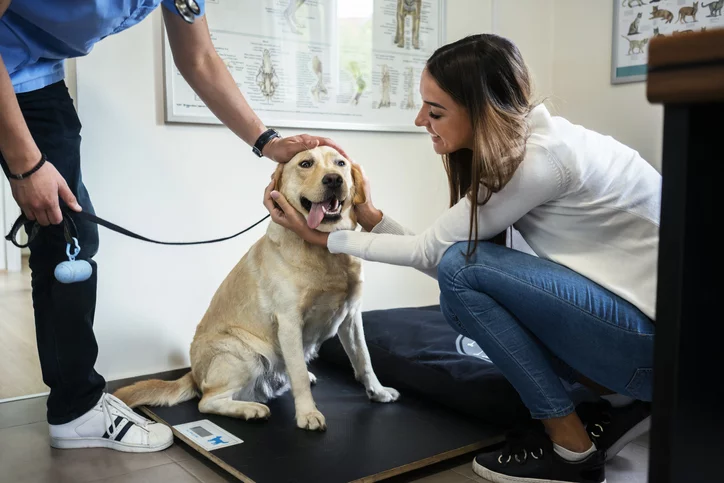Why is My Dog Losing Weight?
As a dog owner, you may have noticed that your dog has significantly lost weight, and you are probably wondering why this is happening. There are many reasons why your dog could be losing weight rapidly, and sometimes, this could be a symptom of a more significant issue, while other times, it is because they are eating less than normal and exercising more.
Sometimes, your dog’s weight loss should not be a concern, but if you notice that your dog drops more than ten percent of their body weight in a short time, you should be worried. There are many reasons why your dog is losing weight and a wide variety of problems that can cause weight loss in dogs, and as a dog owner, you should be aware of them. This article outlines the causes of rapid weight loss in dogs and what to do in such situations, so keep reading for more information.

Causes of Excessive Weight Loss in Dogs
Listed below are the main causes:
Diabetes Mellitus
Diabetes Mellitus is a canine disease and one of the causes of rapid weight loss in dogs. This disease occurs when a dog does not have enough insulin and lacks the ability to produce insulin to break down blood sugar for nutrition. When your dog does not have proper insulin levels (when the levels are not balanced), this will lead to severe weight loss.
This is because the dog’s system will begin to break down fats and proteins for energy, leading to significant weight loss and physical decline over time. If you think your dog has Diabetes Mellitus, you should contact your veterinarian immediately to make a management plan. Your veterinarian will run different tests, including urinalysis and blood glucose, to confirm your dog has Diabetes Mellitus.
The treatment for this canine disease usually includes a specialized diet and insulin injections. Apart from the significant weight loss, other symptoms that a dog may show when they have Diabetes Mellitus include:
- Constant urination.
- Getting hungry easily.
- Formation of cataract.
- Drinking water excessively.
Parasites
Heavy parasite loads are another cause of weight loss in dogs but it is not as common as it used to be in the previous years due to the monthly oral or topical preventions that dogs receive against heartworm and intestinal parasites. Not every product is effective in getting rid of worms in dogs, and if your dog is suspected to have intestinal parasites, a fecal exam will be taken to confirm.
A fecal exam occurs when your veterinarian examines your dog’s feces for parasite life stages, worms, or eggs. Every parasite has its life stage, so it depends on the parasite in your dog’s system. When the parasites are removed from your dog’s system, their weight should improve. Treatment of intestinal parasites usually includes monthly preventive medicine alongside a broad-spectrum de-wormer.
Cancer
As stated above, weight loss indicates health, so it’s always important to take your dog to see a veterinarian when you notice significant weight loss. Cancer usually changes how a dog’s body uses nutrients, which is why rapid, excessive weight loss is always the first noticeable symptom.
Different types of cancer can cause weight loss in dogs and are usually prevalent in older dogs, with the malignant forms being the most life-threatening. Malignant tumors may cause weight loss because of the tumor’s metabolic demands and discomfort, which causes a decrease in the dog’s appetite.
If you notice that your dog is showing any signs of cancer, you should immediately contact your veterinarian and schedule an examination. Your veterinarian will perform tests to find out whether your dog has cancer and will also advise you on the different treatment plans available if your dog has cancer.
Pain Issues
When your dog has physical pain issues, it can cause them to stop eating, leading to weight loss over time. The pain will be too much for them, and they will avoid eating. For example, your dog may find it difficult to chew when they have sores inside their mouth, a broken tooth, or lesions on their tongue.
Things like cramps, bloating, and gas can make your dog feel discomfort after eating, so to avoid that, they stay away from eating.
Your dog could have also developed a blockage in their gut after swallowing something they were not supposed to take, and this can stop food from moving through the digestive system.
Kidney Disease
Kidney disease is also another cause of weight loss in dogs but when dogs have kidney disease, they do not lose weight immediately. If you find out that your pet has kidney disease and they have been losing weight over time, then there is a possibility that they have been suffering from the illness for a while. A blood test will be able to tell if your dog is suffering from kidney problems, so you can contact your veterinarian.
As the disease in your dog progresses, they will have to deal with different symptoms, including weight loss, which impacts the body and muscle fat, leading to your dog’s emaciation.
Contact a Veterinarian if Your Dog is Losing Weight
There you have it – five causes of excessive weight loss in dogs. If you notice that your dog is losing weight, you should contact your veterinarian immediately because there are many reasons why that will happen. This way, your veterinarian can pinpoint the exact cause and find a solution to it.
For more information, or if you have concerns about your pets health, contact Warrick Veterinary Clinic by calling (812) 897-4855. We provide compassionate veterinary care and will be there for you and your pet.
